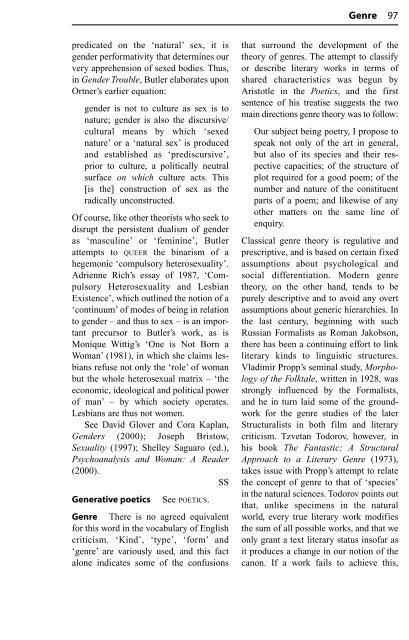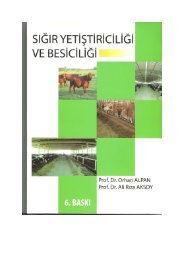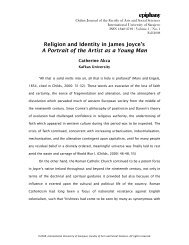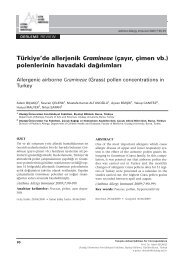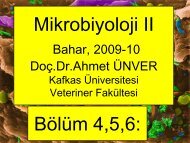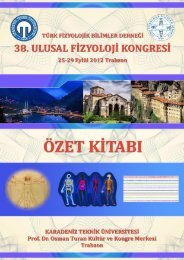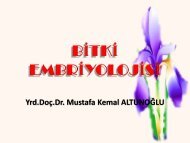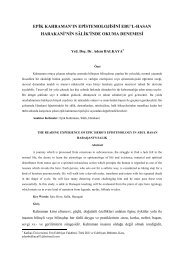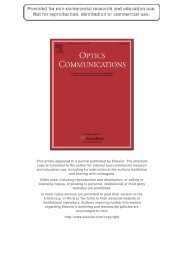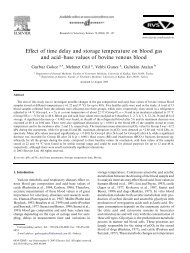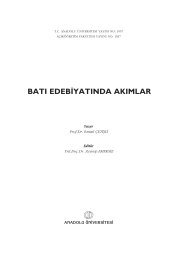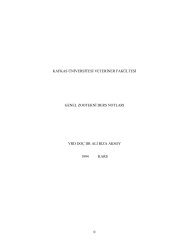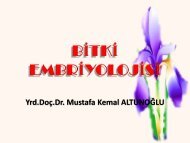The Routledge Dictionary of Literary Terms
The Routledge Dictionary of Literary Terms
The Routledge Dictionary of Literary Terms
Create successful ePaper yourself
Turn your PDF publications into a flip-book with our unique Google optimized e-Paper software.
predicated on the ‘natural’ sex, it is<br />
gender performativity that determines our<br />
very apprehension <strong>of</strong> sexed bodies. Thus,<br />
in Gender Trouble, Butler elaborates upon<br />
Ortner’s earlier equation:<br />
gender is not to culture as sex is to<br />
nature; gender is also the discursive/<br />
cultural means by which ‘sexed<br />
nature’ or a ‘natural sex’ is produced<br />
and established as ‘prediscursive’,<br />
prior to culture, a politically neutral<br />
surface on which culture acts. This<br />
[is the] construction <strong>of</strong> sex as the<br />
radically unconstructed.<br />
Of course, like other theorists who seek to<br />
disrupt the persistent dualism <strong>of</strong> gender<br />
as ‘masculine’ or ‘feminine’, Butler<br />
attempts to QUEER the binarism <strong>of</strong> a<br />
hegemonic ‘compulsory heterosexuality’.<br />
Adrienne Rich’s essay <strong>of</strong> 1987, ‘Compulsory<br />
Heterosexuality and Lesbian<br />
Existence’, which outlined the notion <strong>of</strong> a<br />
‘continuum’ <strong>of</strong> modes <strong>of</strong> being in relation<br />
to gender – and thus to sex – is an important<br />
precursor to Butler’s work, as is<br />
Monique Wittig’s ‘One is Not Born a<br />
Woman’ (1981), in which she claims lesbians<br />
refuse not only the ‘role’ <strong>of</strong> woman<br />
but the whole heterosexual matrix – ‘the<br />
economic, ideological and political power<br />
<strong>of</strong> man’ – by which society operates.<br />
Lesbians are thus not women.<br />
See David Glover and Cora Kaplan,<br />
Genders (2000); Joseph Bristow,<br />
Sexuality (1997); Shelley Saguaro (ed.),<br />
Psychoanalysis and Woman: A Reader<br />
(2000).<br />
SS<br />
Generative poetics See POETICS.<br />
Genre <strong>The</strong>re is no agreed equivalent<br />
for this word in the vocabulary <strong>of</strong> English<br />
criticism. ‘Kind’, ‘type’, ‘form’ and<br />
‘genre’ are variously used, and this fact<br />
alone indicates some <strong>of</strong> the confusions<br />
Genre 97<br />
that surround the development <strong>of</strong> the<br />
theory <strong>of</strong> genres. <strong>The</strong> attempt to classify<br />
or describe literary works in terms <strong>of</strong><br />
shared characteristics was begun by<br />
Aristotle in the Poetics, and the first<br />
sentence <strong>of</strong> his treatise suggests the two<br />
main directions genre theory was to follow:<br />
Our subject being poetry, I propose to<br />
speak not only <strong>of</strong> the art in general,<br />
but also <strong>of</strong> its species and their respective<br />
capacities; <strong>of</strong> the structure <strong>of</strong><br />
plot required for a good poem; <strong>of</strong> the<br />
number and nature <strong>of</strong> the constituent<br />
parts <strong>of</strong> a poem; and likewise <strong>of</strong> any<br />
other matters on the same line <strong>of</strong><br />
enquiry.<br />
Classical genre theory is regulative and<br />
prescriptive, and is based on certain fixed<br />
assumptions about psychological and<br />
social differentiation. Modern genre<br />
theory, on the other hand, tends to be<br />
purely descriptive and to avoid any overt<br />
assumptions about generic hierarchies. In<br />
the last century, beginning with such<br />
Russian Formalists as Roman Jakobson,<br />
there has been a continuing effort to link<br />
literary kinds to linguistic structures.<br />
Vladimir Propp’s seminal study, Morphology<br />
<strong>of</strong> the Folktale, written in 1928, was<br />
strongly influenced by the Formalists,<br />
and he in turn laid some <strong>of</strong> the groundwork<br />
for the genre studies <strong>of</strong> the later<br />
Structuralists in both film and literary<br />
criticism. Tzvetan Todorov, however, in<br />
his book <strong>The</strong> Fantastic: A Structural<br />
Approach to a <strong>Literary</strong> Genre (1973),<br />
takes issue with Propp’s attempt to relate<br />
the concept <strong>of</strong> genre to that <strong>of</strong> ‘species’<br />
in the natural sciences. Todorov points out<br />
that, unlike specimens in the natural<br />
world, every true literary work modifies<br />
the sum <strong>of</strong> all possible works, and that we<br />
only grant a text literary status ins<strong>of</strong>ar as<br />
it produces a change in our notion <strong>of</strong> the<br />
canon. If a work fails to achieve this,


